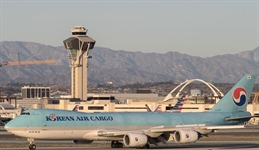
Korean Air reported a downturn in air cargo performance last year as pandemic-era challenges started to ease.
The South Korean flag carrier noted, however, that it was able to maintain "a higher level of profitability" compared to 2019.
"Korean Air's cargo business performed strongly during the pandemic due to global supply chain issues, ocean freight bottlenecks, and limited aircraft belly cargo capacity. However, with the recovery of the air cargo industry post-pandemic, cargo operating profit decreased year-on-year," the carrier said in a statement.
"In the cargo sector, while revenue decreased due to the rebound of passenger belly cargo capacity and the normalization of ocean freight, a higher level of profitability was maintained compared to 2019," it added.
In the first quarter, Korean Air said a rebound of air cargo demand for traditional items, such as semiconductors, automobiles and displays, "remains uncertain" due to the weakened global economy.
"The airline aims to respond flexibly to the ongoing robust demand in e-commerce that has carried over from the end of last year and will respond to supply chain uncertainties arising from global geopolitical risks," the carrier said.
Meanwhile, Korean Air achieved a record-high revenue of KRW 14.5751 trillion (US$ 11.3 billion) in 2023, with an operating profit of KRW 1.5869 trillion (US$1.23 billion).
The airline also achieved a record-high quarterly revenue of KRW 3.9801 trillion (US$ 3.09 billion) in its fourth fiscal quarter.
For the full year of 2023, Korean Air reported a higher operating profit compared to 2019. The airline's 2023 operating profit margin was 10.9% — which it said is a "higher rate" than the industry average.
Korean Air anticipates passenger demand and capacity to fully recover in the first quarter.



